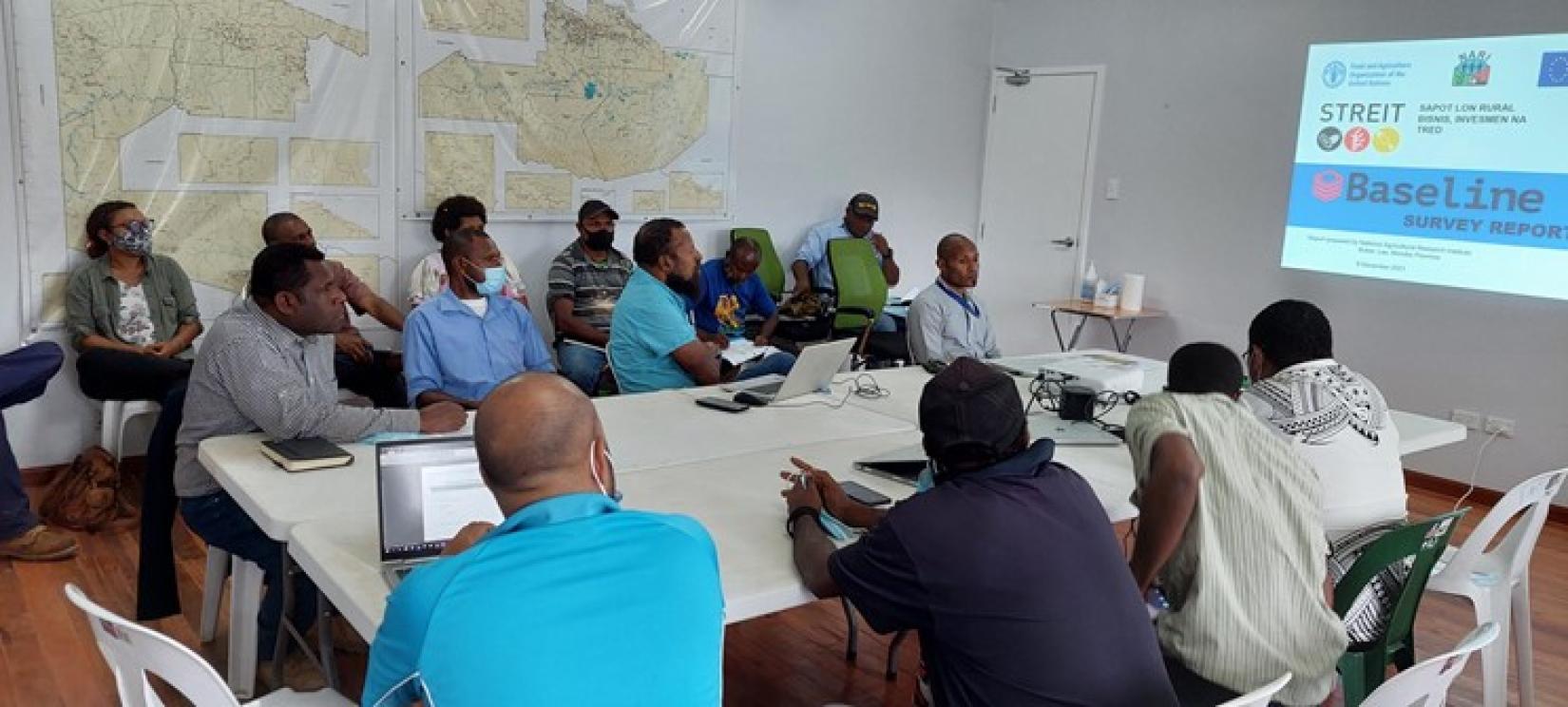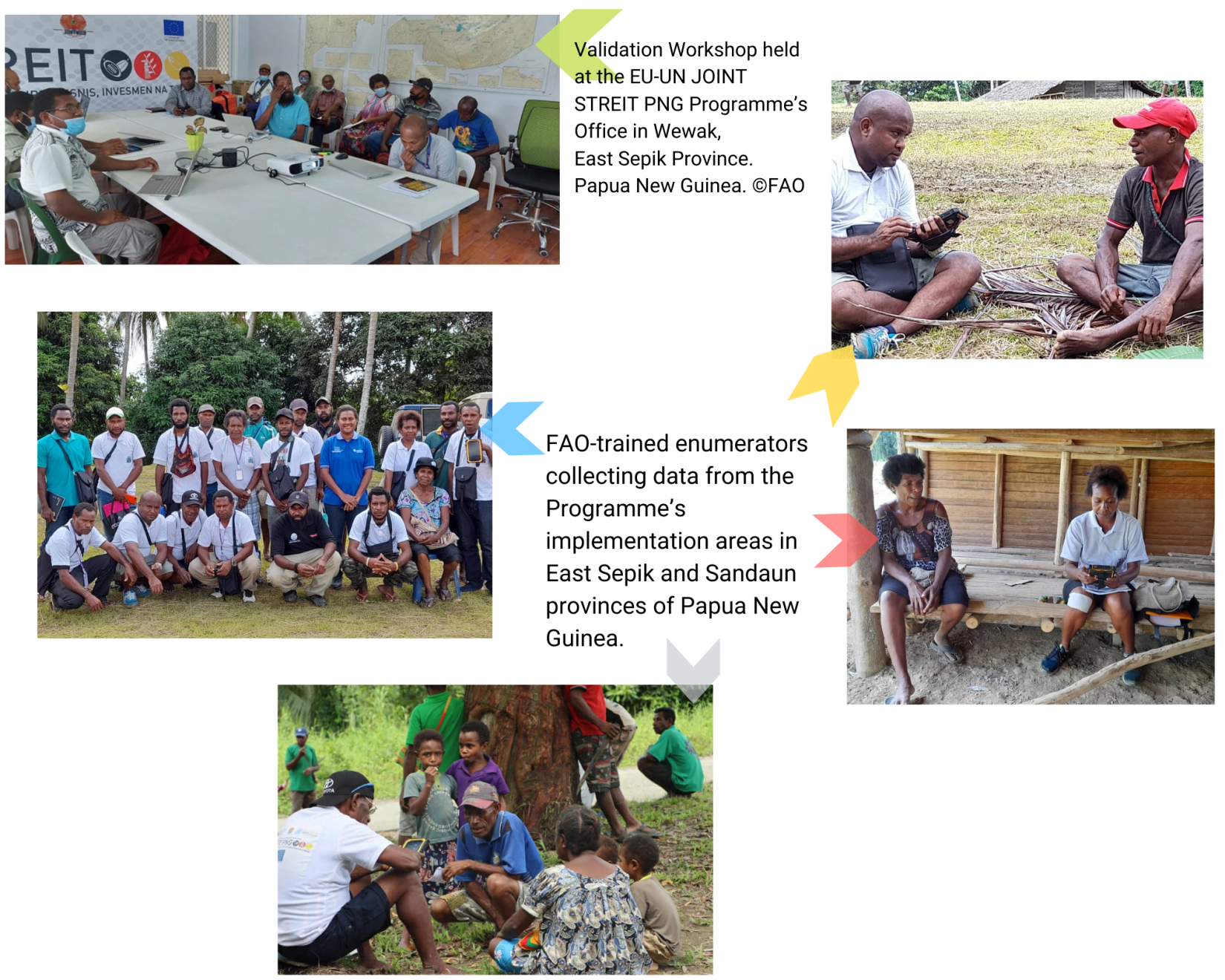Study by EU-STREIT and NARI reveals agri-business development's challenges in the Sepik Region
16 February 2022
|
EU-STREIT Programme in Papua New Guinea, in collaboration with National Agricultural Research Institute, completes a thorough study disclosing the constraints to tap the cocoa, vanilla, and fish value chains' potentials in the Greater Sepik Region. 
Caption: Validation Workshop held at the EU-STREIT PNG Programme’s Office in Wewak, East Sepik Province. Papua New Guinea.
Photo: ©FAO - Papua New Guinea
|
|
Wewak, ESP – A new study by EU-STREIT PNG Programme and National Agricultural Research Institute (NARI) reveals the lack of requisite knowledge and skills at all levels of production, inadequate transport and market infrastructure, and limited financial literacy knowledge are among the key contributing factors to low production and profitability of cocoa, vanilla and fisheries farming that negatively affect the wellbeing of rural households in the Sepik Region.
As a basis for Programme monitoring and evaluation, the study covers a number of indicators, including demographics, farmers’ socio-economic status, household income, performance of cocoa, vanilla and fisheries value chains, the status of key public services (such as information and communication technology [ICT], renewable energy, transport infrastructure, financial services), gender involvement, and nutritional status of villagers in the Greater Sepik Region.
Benefitting from the FAO and NARI's expertise, this study was conducted using data collected from randomly sampled 1,394 farming households in East Sepik and Sandaun provinces where the EU-STREIT PNG Programme is being carried out.
The report highlights the need to improve the production practices for cocoa and vanilla, including the adoption of Climate-Smart Agriculture (CSA) practices and improved post-harvest handling practices in the Programme value chains.
Despite the high potential of fisheries and aquaculture in the area, certain challenges such as limited access to quality inputs, and lack of technical capacity to adopt the best fishing and post-harvest handling practices and techniques, hamper further development of this sector.
The survey also shows that farmers sell their produce (cocoa, vanilla, and fish) outside of their village or community, but lack of road and market access is their biggest concern. Almost two-thirds of the respondents stated that improved road access would lead to more trade (buying and selling) in the villages.
The study reveals that more than 70% of households do not have access to any form of financial services provided by banks and other financial institutions. Provision of an expanded range of tailored and inclusive banking systems enables farmers, rural communities and agricultural enterprises to get access to loan, banking, payment products, saving and services which are critical for agri-business. With reference to gender involvement in the agri-food value chains, the results indicate that decision-making is heavily influenced by traditional norms where men are considered the head of the family.
As per the report, approximately 15% of the population in the target areas has access to reliable electricity, while more than 73% of people living in rural areas have limited or no access to any source of energy. Also, about 60% of the population do not have access to any ICT services in the Programme areas.
Analyses of household diets show that roots and tubers, and dark green, leafy vegetables are the key components, constituting 80 to 90% of the overall household diet. The findings suggest that most households do not have a balanced diet.
The survey was conducted using Computer Assisted Personal Interviewing (CAPI), an innovative tool that allows linking the collected data to a Geographical Information System (GIS), as part of the Programme's overall Monitoring and Evaluation (M&E) System.
To assess the quality of the collected data and discuss the results of the survey, NARI in collaboration with the Programme, held a validation workshop with the presence of stakeholder agencies and implementing partners, including the National Cocoa Board, National Spice Board, Department of Commerce and Industry, Provincial Policy and Planning Office, Ramangs Cocoa Development Project, National Fisheries Authority, CRDA Ltd., and Foundation of Women in Agriculture Development. |
EU-STREIT PNG, being implemented as a United Nations Joint Programme (FAO as leading agency/administrative agent, and ILO, ITU, UNCDF, and UNDP as implementing partners), is the largest grant-funded Programme of the European Union in the country and the Pacific region. It focuses on sustainable and inclusive economic development of rural areas through increasing the economic returns and opportunities from cocoa, vanilla, and fishery value chains and strengthening and improving the efficiency of value chain enablers including the business environment and supporting sustainable, climate-proof transport and energy infrastructure development.

|
MEDIA CONTACTS:
|
Kelvin Sogoromo, National Social Media Associate, Kelvin.Sogoromo@fao.org | Mobile/WhatsApp: +675 7422 3769
|
More on the EU STREIT Programme in Papua New Guinea:
|




